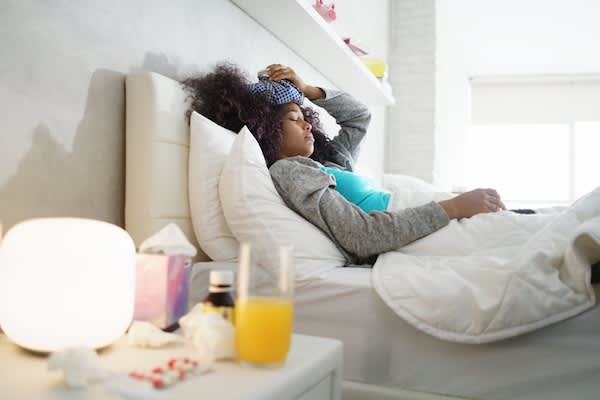[6 MIN READ]
In this article:
-
Mononucleosis (mono) is a contagious disease that is most common among high school and college aged students.
-
While mono typically goes away on its own, you will probably need several weeks to more than a month to recover. Be sure to stay away from strenuous activities for a while.
-
The most common symptoms of mono are extreme tiredness, fever, sore throat, headaches and body aches, swollen lymph nodes in the neck and armpits, swollen liver or spleen, and rash.
What is mono? Causes, symptoms and recovery
Many adults can remember a high school classmate who missed classes for weeks or even months because of mononucleosis (mono). While it’s sometimes called “the kissing disease,” some people aren’t sure what mono is, how it occurs or how long the recovery process takes.
Jason Ho, M.D., a Providence urgent care specialist who sees patients in Manhattan Beach, California, explains all you need to know about mono.
What is mono disease?
Mononucleosis is a contagious disease caused by the Epstein-Barr virus (EBV), which is a member of the herpes family. EBV is one of the most common human viruses in the world.
The reason mono is known as “the kissing disease” is because it spreads through saliva.
How does mono spread?
While kissing an infected person can cause you to develop mono, kissing isn’t the only way the disease spreads.
You can also get mono by:
- Being close to an infected person when they cough or sneeze
- Sharing eating utensils or drinks with an infected person
- Using the same toothbrush as an infected person
Teenagers and young adults are most at risk for mono because they are more likely to encounter the EBV during their formative years. They are also likely to have severe reactions to the virus. People with weakened immune systems also are more at risk for mono.
Recognizing the symptoms and stages of mono
“Symptoms of mononucleosis usually appear four to six weeks after exposure,” says Dr. Ho, “and include extreme fatigue, fever, sore throat, headaches and body aches, swollen lymph nodes in the neck and armpits, swollen liver or spleen, and rash. Often mono can mimic a bad cold or flu.”
Typically, mono has four distinct stages:
Incubation period
During this stage, which typically lasts four to six weeks, the Epstein virus is inactive within the body, but it’s multiplying. Symptoms are either mild or nonexistent.
Prodromal stage
This stage is often mistaken for a cold or the flu. Lasting three to five days, the prodromal stage includes symptoms of fatigue, headache, sore throat and low-grade fever.
Acute stage
This is the peak of mononucleosis, often lasting two to four weeks. Common symptoms include high fever, severe sore throat, swollen lymph nodes, fatigue, an enlarged spleen and sometimes a rash or liver issues.
Convalescent stage
The recovery period for mono lasts anywhere from several weeks to several months. There is a gradual improvement in energy levels and symptoms, although you may still feel fatigue for a while.
Will mono go away on its own? Treatment options
Yes, mono typically goes away on its own without treatment. Most symptoms will go away after a few weeks or months.
It’s most important to let the body’s natural recovery process work when you’re suffering from mono. Antibiotics won’t work on mono, because it’s a viral infection, and antibiotics only treat bacterial infections.
“Treatment is supportive care — plenty of rest, fluids, over-the-counter medications for pain and fever,” says Dr. Ho. “Antibiotics will not help and should be avoided as certain ones, like amoxicillin or penicillin, can cause a rash.”
Can mono kill you? Understanding complications
“Severe complications are very rare,” says Dr. Ho, “but patients should avoid contact sports until recovery because of the possibility of rupturing the spleen. Those with underlying immune system issues or organ transplants are at higher risk for serious complications.”
When to see a Providence provider
“If a patient has typical mono symptoms, thinks they have mono or has been exposed,” says Dr. Ho, “it’s good to check with a health care provider to find a correct diagnosis and treatment plan.”
It’s particularly important to call a doctor if you experience any of the following mono symptoms:
- Severe abdominal pain – this could indicate a ruptured spleen and requires immediate emergency care
- Persistent high fever – a fever over 101.5 F that won’t go away could indicate a bigger problem
- Jaundice – if your skin or eyes are yellow, you could be suffering from liver problems
- Difficulty breathing – swollen tonsils can make it hard to breathe
- Signs of dehydration – these include sunken eyes, a dry mouth or passing little urine
Providence offers same-day and urgent care appointments for your convenience, or you can schedule an appointment with your primary care provider.
Your provider can help determine whether your case of mono is more serious than most, and can offer advice on the best ways to stay comfortable while you recover.
Frequently asked questions about mono
Q: What exactly is mono, and why do people call it the “kissing disease”?
A: Mono is an illness caused by a virus called Epstein-Barr. It got the nickname “kissing disease” because it spreads through saliva — but you don’t have to kiss someone to catch it. Sharing drinks or utensils or even being near someone when they cough or sneeze can also spread it.
Q: Who usually contracts mono?
A: Mono is most common in teens and young adults. That’s because they’re more likely to be exposed to the virus and tend to have stronger symptoms. People with weaker immune systems are also more at risk.
Q: What does mono feel like?
A: At first, it can seem like a bad cold or the flu — sore throat, fever, headaches and fatigue. As it becomes worse, you might feel very tired, have swollen glands or even notice your liver or spleen swelling. Recovery can take a while: Some people start to feel better after a couple of weeks, but the fatigue can hang around for months.
Q: How do you treat mono?
A: There isn’t a medicine that “cures” mono, but the good news is your body usually fights it off on its own. The best treatment is rest, drinking plenty of fluids and using over-the-counter pain or fever medicine if you need it. Antibiotics don’t help because mono is caused by a virus, not a bacterial infection.
Q: When should I see a doctor?
A: Most people recover safely at home, but you should call a doctor if you have severe stomach pain, a high fever that won’t go down, yellowing of the skin or eyes, trouble breathing or signs of dehydration. These could be signs of a more serious illness.
Contributing caregiver

Jason Ho, M.D., is an urgent care specialist who sees patients at Providence Medical Institute - Manhattan Beach Primary Care and Urgent Care.
Find a doctor
If you are looking for a primary care or urgent care provider, you can find what you are looking for in our provider directory. Through Providence Express Care Virtual, you can access a full range of health care services.
Download the Providence app
It’s all in the app: easily stay connected with Providence and your health. With the Providence app, you can schedule appointments, have virtual visits from the comfort of your home, get personalized health recommendations, access your health records and so much more. Learn more and download the app.
Related resources
How do you know if your teen has mono?
Comprehensive guide to winter illness
Treating different types of coughs
How to have hard conversations with your teen
This information is not intended as a substitute for professional medical care. Always follow your health care professional’s instructions.
About the Author
More Content by Providence Health Team






















